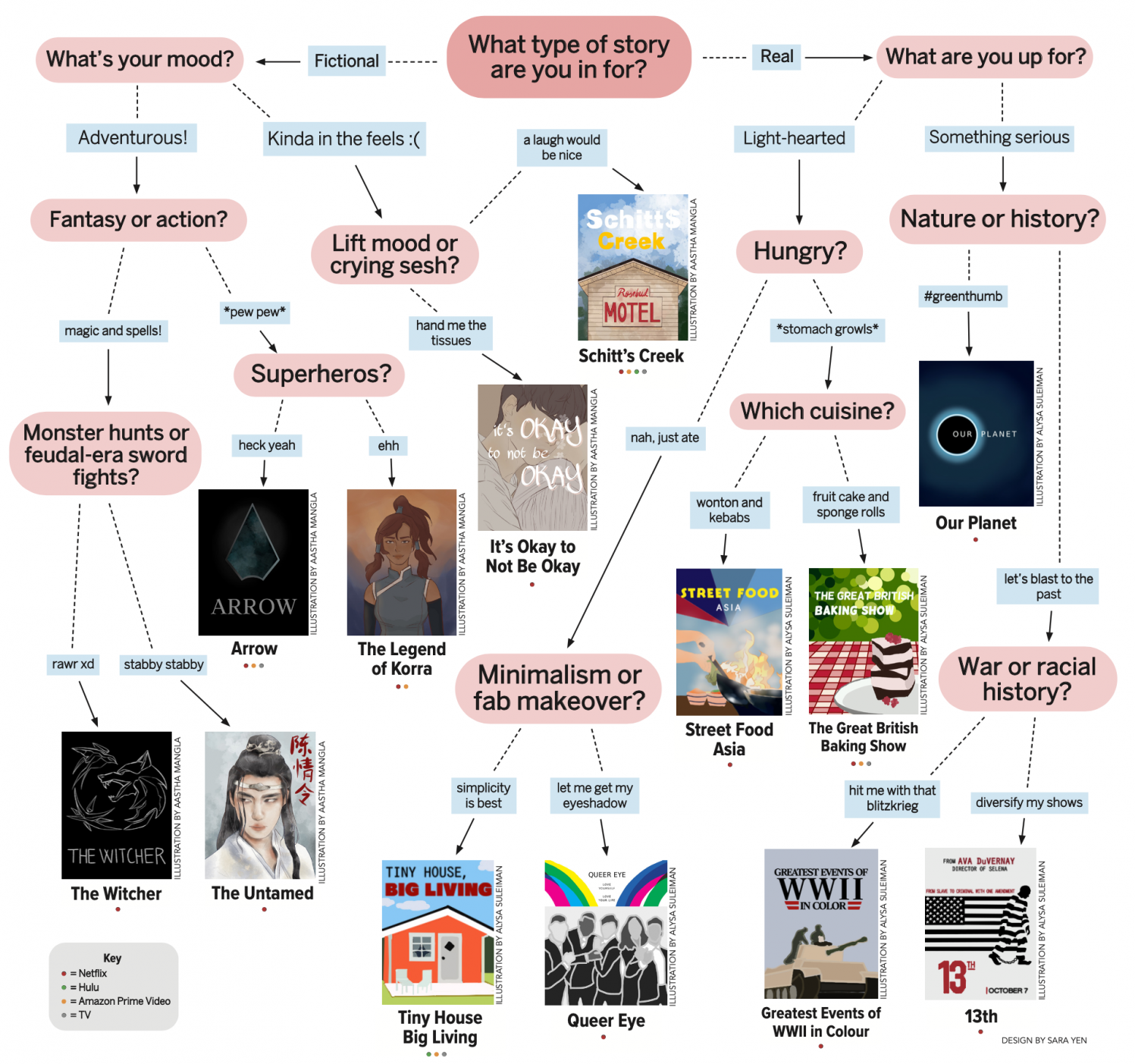Television series adapt to COVID-19
As the coronavirus pandemic has created a series of changes, television series have adapted to production changes, added coronavirus pandemic to storylines, and introduced new COVID-19 documentaries. Even with many changes and additions to TV series, many viewers have enjoyed and are looking forward to their favorite television programs.
October 5, 2020
Since shelter-in-place began across the country in early March, the entertainment industry has changed filming methods to adhere to social distancing. Even with many changes and additions to TV series, many viewers have enjoyed and are looking forward to their favorite television programs.
Reality television shows including “The Voice” and “America’s Got Talent” changed their performance format mid-season to incorporate safety precautions. Season 18 of “The Voice” on NBC converted to a remote format in April, with contestants singing and judges reacting from their homes across the country. Season 19 of “The Voice” will be airing Oct. 19, with the blind auditions already filmed in early August, without a live audience.
“Based on everything that’s going on, I think overall [“The Voice”] did a really good job of incorporating everything and keeping it the same, even if it had to be technically different, and I’m just glad they continued to film and didn’t stop it,” said Samvita Gautham (10), who watched both season 18’s in-person and virtual performances.
While “America’s Got Talent” Season 15 participants performed in-person, there was no live audience during the show. Later in the season in July, the series transitioned to an outdoor stage with video conference performances and judges seated in socially distanced chairs. The next season has started with online auditions. Similarly, the 22nd season of “Family Feud,” which started airing episodes on Sept. 14, took place with health and safety protocols and no audience members. Many other television shows had to take hiatuses from filming or halt production completely, such as The Ellen Show, Jeopardy and Wheel of Fortune.

Other drama television shows have taken the coronavirus pandemic in another direction by adding the pandemic into their storylines. The popular television medical drama “Grey’s Anatomy”, which paused season 16 filming in late March due to the pandemic, revealed their plan in an Emmys.com stream. Executive producer Krista Vernoff said they would “address the pandemic” by talking to real doctors about the impact of the COVID-19 pandemic, which would help the writers incorporate more realistic stories about the lives of their major characters, who are front-line healthcare workers.
“I’m definitely very interested in seeing what Grey’s does around the pandemic, and I do have high hopes for it,” said Sophie Wang (12), who has followed the series for five years and has watched all 16 seasons. “’Grey’s’ always sends a message, and I hope that the message they send with covering the pandemic is what we as a community need to do to overcome the challenges brought on by the pandemic.”
Creator and writer Dan Fogleman of family drama series “This Is Us” also confirmed via Twitter that the show will incorporate the coronavirus into the storyline of their upcoming season. “This Is Us”, which follows the lives of modern-day siblings Kate, Kevin, and Randall, and their parents, Jack and Rebecca, will still have the same planned ending.
Aside from television shows, production companies have broadcasted many new documentaries and docuseries based on the coronavirus. Releases include Netflix’s “Coronavirus, Explained,” “The New York Times Presents,” and DW Documentary’s multiple features on COVID-19 global impacts. The Public Broadcasting Service (PBS) has also released films on the science behind the coronavirus through their FRONTLINE series and long-running series NOVA.
“I think the goal of these documentaries, NOVA especially, is to bring the science to the public in a way that is digestible, so that the public can understand what is being presented without watering it down too much,” said upper school chemistry teacher Andrew Irvine, who has watched the NOVA special “Decoding COVID-19.”
Although the pandemic has imposed substantial limitations, the entertainment industry continues to find ways to adapt while still maintaining a comforting familiarity.


















![“[Building nerf blasters] became this outlet of creativity for me that hasn't been matched by anything else. The process [of] making a build complete to your desire is such a painstakingly difficult process, but I've had to learn from [the skills needed from] soldering to proper painting. There's so many different options for everything, if you think about it, it exists. The best part is [that] if it doesn't exist, you can build it yourself," Ishaan Parate said.](https://harkeraquila.com/wp-content/uploads/2022/08/DSC_8149-900x604.jpg)




![“When I came into high school, I was ready to be a follower. But DECA was a game changer for me. It helped me overcome my fear of public speaking, and it's played such a major role in who I've become today. To be able to successfully lead a chapter of 150 students, an officer team and be one of the upperclassmen I once really admired is something I'm [really] proud of,” Anvitha Tummala ('21) said.](https://harkeraquila.com/wp-content/uploads/2021/07/Screen-Shot-2021-07-25-at-9.50.05-AM-900x594.png)







![“I think getting up in the morning and having a sense of purpose [is exciting]. I think without a certain amount of drive, life is kind of obsolete and mundane, and I think having that every single day is what makes each day unique and kind of makes life exciting,” Neymika Jain (12) said.](https://harkeraquila.com/wp-content/uploads/2017/06/Screen-Shot-2017-06-03-at-4.54.16-PM.png)








![“My slogan is ‘slow feet, don’t eat, and I’m hungry.’ You need to run fast to get where you are–you aren't going to get those championships if you aren't fast,” Angel Cervantes (12) said. “I want to do well in school on my tests and in track and win championships for my team. I live by that, [and] I can do that anywhere: in the classroom or on the field.”](https://harkeraquila.com/wp-content/uploads/2018/06/DSC5146-900x601.jpg)
![“[Volleyball has] taught me how to fall correctly, and another thing it taught is that you don’t have to be the best at something to be good at it. If you just hit the ball in a smart way, then it still scores points and you’re good at it. You could be a background player and still make a much bigger impact on the team than you would think,” Anya Gert (’20) said.](https://harkeraquila.com/wp-content/uploads/2020/06/AnnaGert_JinTuan_HoHPhotoEdited-600x900.jpeg)

![“I'm not nearly there yet, but [my confidence has] definitely been getting better since I was pretty shy and timid coming into Harker my freshman year. I know that there's a lot of people that are really confident in what they do, and I really admire them. Everyone's so driven and that has really pushed me to kind of try to find my own place in high school and be more confident,” Alyssa Huang (’20) said.](https://harkeraquila.com/wp-content/uploads/2020/06/AlyssaHuang_EmilyChen_HoHPhoto-900x749.jpeg)








